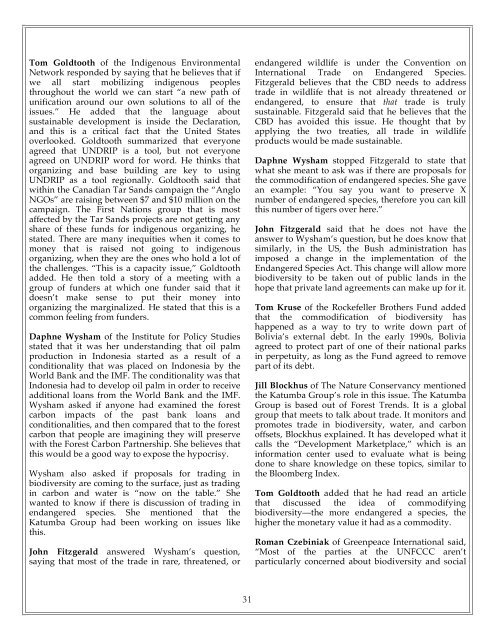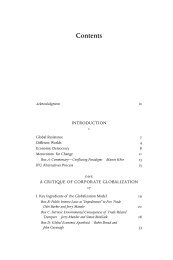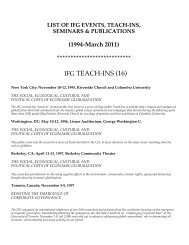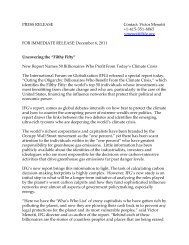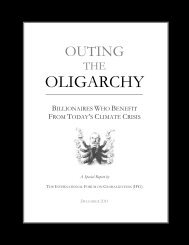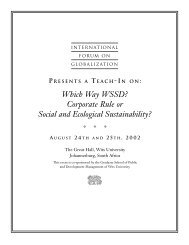UNDRIP Report - English FINAL - International Forum on Globalization
UNDRIP Report - English FINAL - International Forum on Globalization
UNDRIP Report - English FINAL - International Forum on Globalization
Create successful ePaper yourself
Turn your PDF publications into a flip-book with our unique Google optimized e-Paper software.
Tom Goldtooth of the Indigenous Envir<strong>on</strong>mental<br />
Network resp<strong>on</strong>ded by saying that he believes that if<br />
we all start mobilizing indigenous peoples<br />
throughout the world we can start “a new path of<br />
unificati<strong>on</strong> around our own soluti<strong>on</strong>s to all of the<br />
issues.” He added that the language about<br />
sustainable development is inside the Declarati<strong>on</strong>,<br />
and this is a critical fact that the United States<br />
overlooked. Goldtooth summarized that every<strong>on</strong>e<br />
agreed that <str<strong>on</strong>g>UNDRIP</str<strong>on</strong>g> is a tool, but not every<strong>on</strong>e<br />
agreed <strong>on</strong> <str<strong>on</strong>g>UNDRIP</str<strong>on</strong>g> word for word. He thinks that<br />
organizing and base building are key to using<br />
<str<strong>on</strong>g>UNDRIP</str<strong>on</strong>g> as a tool regi<strong>on</strong>ally. Goldtooth said that<br />
within the Canadian Tar Sands campaign the “Anglo<br />
NGOs” are raising between $7 and $10 milli<strong>on</strong> <strong>on</strong> the<br />
campaign. The First Nati<strong>on</strong>s group that is most<br />
affected by the Tar Sands projects are not getting any<br />
share of these funds for indigenous organizing, he<br />
stated. There are many inequities when it comes to<br />
m<strong>on</strong>ey that is raised not going to indigenous<br />
organizing, when they are the <strong>on</strong>es who hold a lot of<br />
the challenges. “This is a capacity issue,” Goldtooth<br />
added. He then told a story of a meeting with a<br />
group of funders at which <strong>on</strong>e funder said that it<br />
doesn’t make sense to put their m<strong>on</strong>ey into<br />
organizing the marginalized. He stated that this is a<br />
comm<strong>on</strong> feeling from funders.<br />
Daphne Wysham of the Institute for Policy Studies<br />
stated that it was her understanding that oil palm<br />
producti<strong>on</strong> in Ind<strong>on</strong>esia started as a result of a<br />
c<strong>on</strong>diti<strong>on</strong>ality that was placed <strong>on</strong> Ind<strong>on</strong>esia by the<br />
World Bank and the IMF. The c<strong>on</strong>diti<strong>on</strong>ality was that<br />
Ind<strong>on</strong>esia had to develop oil palm in order to receive<br />
additi<strong>on</strong>al loans from the World Bank and the IMF.<br />
Wysham asked if any<strong>on</strong>e had examined the forest<br />
carb<strong>on</strong> impacts of the past bank loans and<br />
c<strong>on</strong>diti<strong>on</strong>alities, and then compared that to the forest<br />
carb<strong>on</strong> that people are imagining they will preserve<br />
with the Forest Carb<strong>on</strong> Partnership. She believes that<br />
this would be a good way to expose the hypocrisy.<br />
Wysham also asked if proposals for trading in<br />
biodiversity are coming to the surface, just as trading<br />
in carb<strong>on</strong> and water is “now <strong>on</strong> the table.” She<br />
wanted to know if there is discussi<strong>on</strong> of trading in<br />
endangered species. She menti<strong>on</strong>ed that the<br />
Katumba Group had been working <strong>on</strong> issues like<br />
this.<br />
John Fitzgerald answered Wysham’s questi<strong>on</strong>,<br />
saying that most of the trade in rare, threatened, or<br />
endangered wildlife is under the C<strong>on</strong>venti<strong>on</strong> <strong>on</strong><br />
<str<strong>on</strong>g>Internati<strong>on</strong>al</str<strong>on</strong>g> Trade <strong>on</strong> Endangered Species.<br />
Fitzgerald believes that the CBD needs to address<br />
trade in wildlife that is not already threatened or<br />
endangered, to ensure that that trade is truly<br />
sustainable. Fitzgerald said that he believes that the<br />
CBD has avoided this issue. He thought that by<br />
applying the two treaties, all trade in wildlife<br />
products would be made sustainable.<br />
Daphne Wysham stopped Fitzgerald to state that<br />
what she meant to ask was if there are proposals for<br />
the commodificati<strong>on</strong> of endangered species. She gave<br />
an example: “You say you want to preserve X<br />
number of endangered species, therefore you can kill<br />
this number of tigers over here.”<br />
John Fitzgerald said that he does not have the<br />
answer to Wysham’s questi<strong>on</strong>, but he does know that<br />
similarly, in the US, the Bush administrati<strong>on</strong> has<br />
imposed a change in the implementati<strong>on</strong> of the<br />
Endangered Species Act. This change will allow more<br />
biodiversity to be taken out of public lands in the<br />
hope that private land agreements can make up for it.<br />
Tom Kruse of the Rockefeller Brothers Fund added<br />
that the commodificati<strong>on</strong> of biodiversity has<br />
happened as a way to try to write down part of<br />
Bolivia’s external debt. In the early 1990s, Bolivia<br />
agreed to protect part of <strong>on</strong>e of their nati<strong>on</strong>al parks<br />
in perpetuity, as l<strong>on</strong>g as the Fund agreed to remove<br />
part of its debt.<br />
Jill Blockhus of The Nature C<strong>on</strong>servancy menti<strong>on</strong>ed<br />
the Katumba Group’s role in this issue. The Katumba<br />
Group is based out of Forest Trends. It is a global<br />
group that meets to talk about trade. It m<strong>on</strong>itors and<br />
promotes trade in biodiversity, water, and carb<strong>on</strong><br />
offsets, Blockhus explained. It has developed what it<br />
calls the “Development Marketplace,” which is an<br />
informati<strong>on</strong> center used to evaluate what is being<br />
d<strong>on</strong>e to share knowledge <strong>on</strong> these topics, similar to<br />
the Bloomberg Index.<br />
Tom Goldtooth added that he had read an article<br />
that discussed the idea of commodifying<br />
biodiversity—the more endangered a species, the<br />
higher the m<strong>on</strong>etary value it had as a commodity.<br />
Roman Czebiniak of Greenpeace <str<strong>on</strong>g>Internati<strong>on</strong>al</str<strong>on</strong>g> said,<br />
“Most of the parties at the UNFCCC aren’t<br />
particularly c<strong>on</strong>cerned about biodiversity and social<br />
31


